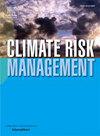Unseen suffering: Social injustice among women during climate-induced migration in Pakistan
IF 4.8
2区 环境科学与生态学
Q1 ENVIRONMENTAL SCIENCES
引用次数: 0
Abstract
Women are highly exposed to climate-induced natural disasters in Pakistan due to socio-cultural barriers resulting in heightened social injustice among them. This paper investigates the drivers of social injustice during forced migration among women living in vulnerable areas of Pakistan. The study utilized data from fifteen key informants’ interviews by employing a systematic narrative analysis to investigate women’s responses towards migration and gender dimensions of adverse climatic events. The results show that economic, socio-cultural, and health related factors were among the key contributors exposing women to social injustice during migration while in search for better life. The findings further unveiled that decisions regarding migration were mainly taken by the household heads especially who in most cases were the male family members. In all circumstances, securing lives, livelihoods, and properties, access to better education, healthcare facilities, and to overall improve socioeconomic situation of the household, were the primary goals of deciding to move to newfound. Given that some members of the household pursue migration as a result of adverse climatic events, government strategies are required to mitigate risks at destinations and create opportunities for the displaced populations.
看不见的痛苦:巴基斯坦妇女在气候导致的移徙中遭受的社会不公
在巴基斯坦,由于社会文化方面的障碍,妇女极易受到气候引起的自然灾害的影响,从而加剧了她们之间的社会不公。本文调查了生活在巴基斯坦脆弱地区的妇女被迫迁徙期间社会不公的驱动因素。研究利用 15 个关键信息提供者的访谈数据,通过系统的叙事分析,调查了妇女对迁移的反应以及不利气候事件的性别层面。研究结果表明,经济、社会文化和健康相关因素是导致妇女在寻求更好生活的移徙过程中遭受社会不公的主要原因。研究结果进一步揭示,有关迁移的决定主要由户主做出,特别是在大多数情况下,户主都是男性家庭成员。在所有情况下,确保生命、生计和财产安全,获得更好的教育和医疗设施,以及全面改善家庭 的社会经济状况,都是决定迁往新地方的首要目标。鉴于一些家庭成员因不利气候事件而迁移,政府需要制定战略,以降低目的地的风险,并为流离失所者创造机会。
本文章由计算机程序翻译,如有差异,请以英文原文为准。
求助全文
约1分钟内获得全文
求助全文
来源期刊

Climate Risk Management
Earth and Planetary Sciences-Atmospheric Science
CiteScore
8.20
自引率
4.50%
发文量
76
审稿时长
30 weeks
期刊介绍:
Climate Risk Management publishes original scientific contributions, state-of-the-art reviews and reports of practical experience on the use of knowledge and information regarding the consequences of climate variability and climate change in decision and policy making on climate change responses from the near- to long-term.
The concept of climate risk management refers to activities and methods that are used by individuals, organizations, and institutions to facilitate climate-resilient decision-making. Its objective is to promote sustainable development by maximizing the beneficial impacts of climate change responses and minimizing negative impacts across the full spectrum of geographies and sectors that are potentially affected by the changing climate.
 求助内容:
求助内容: 应助结果提醒方式:
应助结果提醒方式:


